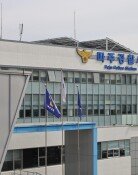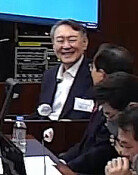Election Commission Issues 24 Warnings
Election Commission Issues 24 Warnings
Posted December. 03, 2005 04:48,
Compared to last years general election period, this year reportedly witnessed an increased number of unfair and biased reports by Internet press and portal sites in the past two parliamentary elections.
The Internet media must fulfill its obligations corresponding to its status and rights as a press source guaranteed by laws and institutions, said Im Jong-il, a member of the Internet Election News Deliberation Commission (IENDC) of the National Election Commission (NEC) on December 2 in a debate session on Internet press and fairness of election coverage held at the Electoral Training Institute.
According to Im, there were nine cases of violations of Internet press fairness and equity deliberated and mandated by the IENDC during last years general election, but the figure rose to 11 and 13 in the re-election and by-election on April 30 and the re-election on October 26, respectively.
Daily Surprise was required to publicize the warning, the strictest sanction, after being charged with reprinting twice a letter of appeal posted on the partys message board written by a political partys election support group leader and attaching a link of the message to the article.
The reported breach of rules by portal sites which carry news of other press also jumped from one during the general election last year to three and seven in the April re-election and by-election and Octobers re-election, respectively.
Nate.com was given a warning for posting a photo of an election campaign of only one specific party while reproducing an article from other press during the October re-election period, and Daum, Naver, and Yahoo Korea were also warned for removing a candidates photo from the news reprinted from other press.
Although portals value commercialism over responsibility as media, more prudent editing and technical improvement is required for election news, said Im, who added, Their responsibility for fair election coverage must be stressed more than any other Internet press.
Meanwhile, Lee Jun-hee, the executive director of the Korea Internet Journalist Association argued in the debate, Reports highlighting the minoritys perspectives and opinions must not unilaterally be assessed as lacking objectivity.
Kang-Myoung Chang tesomiom@donga.com





![지하철 타고 가는 북한산성…외국인도 반한 ‘K등산 맛집’[전승훈 기자의 아트로드]](https://dimg.donga.com/c/138/175/90/1/wps/NEWS/IMAGE/2026/01/10/133120824.1.jpg)
![두쫀쿠가 뭐라고…영하 8도에 아이들 1시간 줄세운 어린이집 [e글e글]](https://dimg.donga.com/c/138/175/90/1/wps/NEWS/IMAGE/2026/01/09/133126969.3.jpg)
